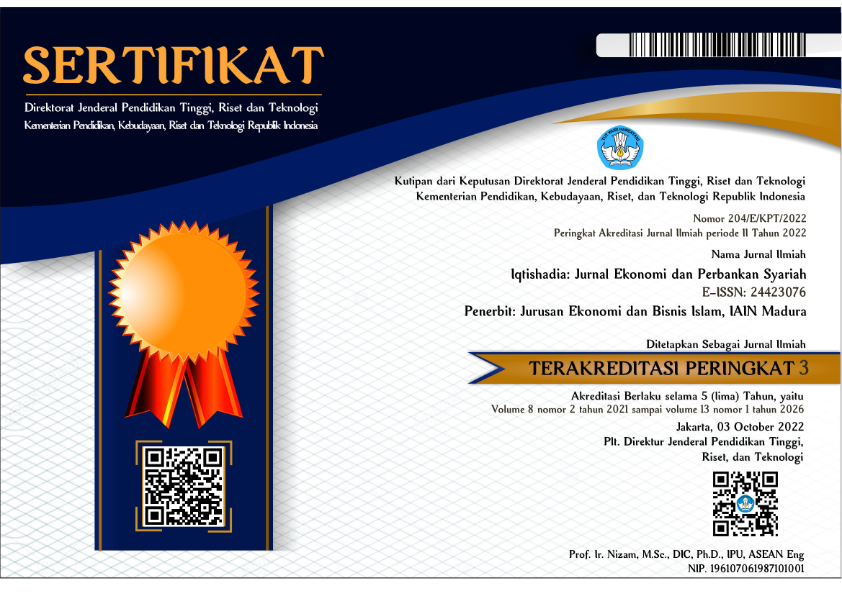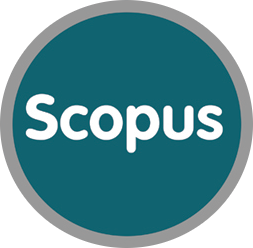Does Digital Financial Inclusion in Sharia Commercial Banks Drive Economic Transformation in Madura?
 Abstract views: 231
,
Abstract views: 231
,
 PDF downloads: 77
PDF downloads: 77
Abstract
The urgency of financial inclusion has been widely recognized and has even become one of the focuses of governments in several countries in the world, including Indonesia. In the era of increasingly rapid digital acceleration due to the pandemic, financial inclusion by banks that focus on digitalization takes a significant role in realizing a better economic transformation through digital financial services, Laku Pandai, digital account ownership, and other financing facilities. Sharia Commercial Banks are still the driving force for financial services in various regions in Indonesia, including Madura, this is because banking has a scope that is more accessible to the public and fulfills the religious value of the Madurese community. The purpose of this study is to determine whether Sharia Commercial Banks have been able to encourage economic transformation in Madura inclusively in the digitalization era. This study uses quantitative research methods with multiple linear regression analysis (Ordinary Least Square) with the help of EViews 9.0 software. The result of the study found that the contribution of financial inclusion made by Sharia Commercial Banks was able to encourage economic transformation in Madura and Showed significant development.
Downloads
References
Asare Vitenu-Sackey, Prince, and Jiang Hongli, ‘Financial Inclusion and Poverty Alleviation: The Contribution of Commercial Banks in West Africa’, International Journal of Business, Economics and Management, 7.1 (2020), 57–70
Aziz, Abdul, and Umma Naima, ‘Technology in Society Rethinking Digital Financial Inclusion : Evidence from Bangladesh’, Technology in Society, 64.August 2020 (2021), 101509
Bank, Asian Development, ‘Financial Inclusion : New Measurement and Cross-Country’, ADB Economics Working Paper Series, 539, 2018
Boukhatem, Jamel, ‘Assessing the Direct Effect of Financial Development on Poverty Reduction in a Panel of Low- and Middle-Income Countries’, Research in International Business and Finance, 37 (2016), 214–30
Demirguc-Kunt, Asli, Leora Klapper, and Dorothe Singer, Financial Inclusion and Inclusive Growth: A Review of Recent Empirical Evidence, The World Bank (Washington D.C, 2017)
Erlando, Angga, Feri Dwi Riyanto, and Someya Masakazu, ‘Financial Inclusion, Economic Growth, and Poverty Alleviation: Evidence from Eastern Indonesia’, Heliyon, 6.10 (2020), e05235
Fauzan, Iwan Fathi, Muhammad Firdaus, and Sahara Sahara, ‘Regional Financial Inclusion and Poverty: Evidence from Indonesia’, Economic Journal of Emerging Markets, 12.1 (2020), 25–38
Kim, Dai-won, Jung-suk Yu, and M Kabir Hassan, ‘Financial Inclusion and Economic Growth in OIC Countries’, Research in International Business and Finance, 2017
Makina, Daniel, and Yabibal M Walle, Financial Inclusion and Economic Growth: Evidence from a Panel of Selected African Countries, Extending Financial Inclusion in Africa (Elsevier Inc., 2019)
Pohan, Masniarita, ‘Transformasi Ekonomi, Struktur Masyarakat Berbasis Gender, Dan Kesejahteraan Pekerja Perempuan Di Indonesia’, Jurnal Manajemen Maranatha, 4.4 (2004), 43–60
Sanjaya, I Made, and Nursechafia, ‘Inklusi Keuangan Dan Pertumbuhan Inklusif : Analisis Antar Provinsi Di Indonesia’, Buletin Ekonomi Moneter Dan Perbankan, 18.3 (2016), 281–306
Sastiono, Prani, and Chaikal Nuryakin, ‘Inklusi Keuangan Melalui Program Layanan Keuangan Digital Dan Laku Pandai Financial Inclusion : Case Study of LKD and Laku Pandai Program’, 19.2 (2019), 242–62
Setiawan, Moh. Agung, ‘Analisis Keterkaitan Inklusi Keuangan Terhadap Perilaku Kaeuangan Personal Mayarakat Di Wilayah Kota Dan Kabupaten Provinsi Jawa Timur’, Jiscos, 3.1 (2016), 1–19
Sharma, Rajesh, Manish Didwania, and Puneet Kumar, ‘Need of Financial Inclusion for Poverty Allevation and GDP Growth’, 1.6 (2011)
Ulum, Bahrul, and Siti Raaudhatul Jannah, Kosmopolitanisme Di Persimpangan Jalan: Hegemoni Sosial-Politik Putra Daerah, ed. by Mohd. Arifullah, 1st edn (DI Yogyakarta: Magnum Pustaka Utama, 2017)
The journal operates an Open Access policy under a Creative Commons Non-Commercial Share-Alike license. All articles published Open Access will be immediately and permanently free for everyone to read and download.
• Creative Commons Attribution-NonCommercial (CC-BY-NC)

Iqtishadia: Jurnal Ekonomi dan Perbankan Syariah by http://ejournal.iainmadura.ac.id/index.php/iqtishadia is licensed under a Creative Commons Attribution-NonCommercial 4.0 International License.
Based on a work at http://ejournal.iainmadura.ac.id.
























